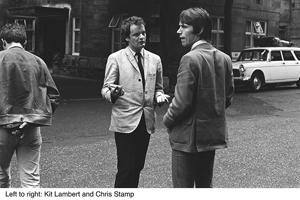by allan tong for FILMbutton
Opens May 8th in Toronto & Vancouver
Before The Who, there was Kit Lambert and Chris Stamp, two aspiring London filmmakers who accidentally managed one of Britain’s greatest rock bands.
In the early-60s, the two were working as assistants at London’s Shepperton Studios, inspired by the French New Wave of Breathless and Jules and Jim. Their passion for film was their only similarity, since they were polar opposites representing Britain’s class divide.
Upper-class Lambert was the son of a famed classical composer, Oxford-educated and gay at a time when it was illegal in England. In contrast, Stamp was a working class “spiv” from London’s tough East End and the son of a tugboat captain (and brother to movie star, Terence Stamp). Together, they planned to film a cinema vérité documentary (the kind that D.A. Pennebaker would soon make about Bob Dylan in Don’t Look Back) by finding a band and managing it. In other words, movie first, band second.
Their search led them to a divey bar in 1964 when they discovered The High Numbers, an exciting yet scruffy band that played for London’s Mods. Shaped by Lambert and Stamp, The High Numbers became The Who and its lead guitarist, Pete Townshend started writing his own songs, notably the anthem, My Generation.
What followed was a wild ride through the cultural revolution of the mid-60s where Lambert and Stamp learned to manage one of the most difficult bands there is to manage. This candid and entertaining documentary chronicles Lambert and Stamp’s relationship with The Who ,and each other, until the 70s when drugs, money and ego finally tore the managers apart from the band they helped propel to stardom. By then, Tommy was a smash hit that saved the band from breaking up.
The film, by first-time director James D. Cooper, succeeds in pointing up the day-and-night differences of posh Lambert and working class Stamp, but the focus really lies between Lambert and Townshend. Lambert encouraged Townshend to reach higher as a composer, most notably in the late-60s with Tommy.
Cooper tells the story with generous amounts of archival footage, most notably vintage black-and-white film from Lambert and Stamp, including a glimpse of Townshend playing Glittering Girl for them in studio, circa 1967. Lambert tells his story in older film interviews up until he died in 1981, while Stamp was extensively filmed before he passed away in 2012. Just as importantly, Cooper interviewed the surviving Who members, Townshend and Daltrey (as well as the latter’s wife, Heather) to fill in the story.
If there’s a weakness in this otherwise good film, it’s that the focus meanders at times. Is this Lambert and Stamp’s story or is it about Lambert and Townshend? With all his complexities (rich, gay, drugs, artsy), Lambert sometimes steals the show. Also, the ending doesn’t rise to a satisfying climax, but trails off.
Despite these few flaws, Lambert & Stamp tells The Who’s story from a fresh, new angle, and is essential viewing for any rock fan.



Comments are closed.